Mali Urged to Enhance Social Protection Amid Climate and Conflict Challenges
Mali Confronts the Dual Challenges of Climate Change and Conflict: A Call for Enhanced Social Protection Systems
Mali is currently grappling with the intertwined issues of climate change and ongoing conflict, which are exacerbating vulnerabilities within its population. The nation, located in the Sahel region of West Africa, is experiencing increasing temperatures and erratic rainfall patterns that threaten agricultural productivity and food security. These climatic challenges are further compounded by rising tensions and violence among various armed groups, leading to significant displacement and instability.
As the effects of climate change become more pronounced, the need for robust social protection systems is more urgent than ever. Experts emphasize that strengthening these systems is essential to support the most vulnerable populations who are disproportionately affected by both environmental degradation and conflict-related disruptions. Enhanced social protection measures could provide critical safety nets, including cash transfers, food assistance, and access to healthcare, helping communities to build resilience against these compounding crises.
In addition to immediate humanitarian assistance, there is a pressing need for long-term strategies that address the root causes of both climate vulnerability and conflict. This includes investing in sustainable agricultural practices, promoting water conservation, and fostering community dialogue to resolve conflicts peacefully. Empowering local communities through education and capacity-building initiatives can also play a vital role in creating a more resilient society.
International organizations and governments are being urged to prioritize funding and resources for social protection programs in Mali. Collaborative efforts that involve local stakeholders are crucial to developing tailored solutions that reflect the unique challenges faced by different communities. By investing in social protection systems, Mali can not only alleviate immediate suffering but also pave the way for a more stable and sustainable future in the face of climate change and conflict.


